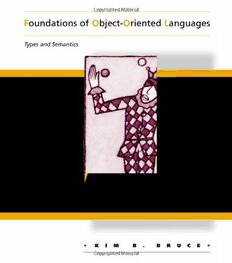Download Foundations of Object-Oriented Languages: Types and Semantics PDF Free - Full Version
Download Foundations of Object-Oriented Languages: Types and Semantics by Kim B. Bruce in PDF format completely FREE. No registration required, no payment needed. Get instant access to this valuable resource on PDFdrive.to!
About Foundations of Object-Oriented Languages: Types and Semantics
This is a useful introduction to the theory behind data types in object oriented (OO) languages. It starts at a very readable pace. The first section (about 100 pages) covers the basics of OO languages and OO features, and establishes a working vocabulary. For example, it introduces the very distinct notions of subclass and subtype early on. That is important, if only because words like "subtype" have different meanings when used by different authors. Barbara Liskov, for example, used a semantic definition for "subtype" in her famous substitutability principle, a definition that can not be checked by automatic tools. Here, the definition talks only about the information you might find in a Java interface or C++ abstract class, and can be checked automatically. This early discussion also defines the problem to be solved: creating programming languages that are richly expressive, that compile to efficient code, and that are rigorously type safe, goals that often conflict. The clear statement of the problem is very informative, by itself, and casual readers might stop at this point.The next brief section defines a mathematical notation, a lambda calculus, for discussing types. In this calculus, a "record" or "struct" keyword is an operator that aggregates other types together into a new unit, and C++ templates are functions that generate new types. This calculus feeds into a formal logic that proves statements about types the same way standard arithmetic proves statements about numbers. This isn't nearly as daunting as a normal proof of program correctness, by the way. Behavioral correctness deals with a program's changes of state over time; this treats the program as a static, compile-time entity. Also, for better or worse, it skips the most of the category theory that often accompanies type formalisms.The remaining 200 pages or so constitute the real meat of the discussion. Bruce takes the first section's intuitive ideas about types and languages, phrases them in the second section's formalism, and uses that language to analyze several small, purpose-built OO languages with different type systems. Along the way, Bruce makes a few remarkable claims. One is that, although multiple inheritance can cause pragmatic problems for developers, it's no big deal for the mathematical tools. The real problem is deciding what you mean by multiple inheritance, where C++ and Eiffel provide only two of the possible answers. (Agreed - coming up with something useful to say is often harder than saying it.) Another is that classes really aren't necessary for strong OO typing. Classes are just names for collections of features, and it's the features in the collections that matter. (I see the theory, but I'm not sure that this leads to practical improvements in language design.) Many of these results are quite clear even if you, like me, skip some of the hairier proofs. This is certainly not a book for a beginner to programming or to OO. It's really about the theory of how languages work. It will be of use to developers who create new languages, compilers, or language-smart CASE tools. I doubt that most others will find information relevant to their work. If you really care about the fussy bits of an OO language's type system, though, this book will be very helpful.//wiredweird
Detailed Information
| Author: | Kim B. Bruce |
|---|---|
| Publication Year: | 2002 |
| Pages: | 405 |
| Language: | |
| File Size: | 5.558 |
| Format: | |
| Price: | FREE |
Safe & Secure Download - No registration required
Why Choose PDFdrive for Your Free Foundations of Object-Oriented Languages: Types and Semantics Download?
- 100% Free: No hidden fees or subscriptions required for one book every day.
- No Registration: Immediate access is available without creating accounts for one book every day.
- Safe and Secure: Clean downloads without malware or viruses
- Multiple Formats: PDF, MOBI, Mpub,... optimized for all devices
- Educational Resource: Supporting knowledge sharing and learning
Frequently Asked Questions
Is it really free to download Foundations of Object-Oriented Languages: Types and Semantics PDF?
Yes, on https://PDFdrive.to you can download Foundations of Object-Oriented Languages: Types and Semantics by Kim B. Bruce completely free. We don't require any payment, subscription, or registration to access this PDF file. For 3 books every day.
How can I read Foundations of Object-Oriented Languages: Types and Semantics on my mobile device?
After downloading Foundations of Object-Oriented Languages: Types and Semantics PDF, you can open it with any PDF reader app on your phone or tablet. We recommend using Adobe Acrobat Reader, Apple Books, or Google Play Books for the best reading experience.
Is this the full version of Foundations of Object-Oriented Languages: Types and Semantics?
Yes, this is the complete PDF version of Foundations of Object-Oriented Languages: Types and Semantics by Kim B. Bruce. You will be able to read the entire content as in the printed version without missing any pages.
Is it legal to download Foundations of Object-Oriented Languages: Types and Semantics PDF for free?
https://PDFdrive.to provides links to free educational resources available online. We do not store any files on our servers. Please be aware of copyright laws in your country before downloading.
The materials shared are intended for research, educational, and personal use in accordance with fair use principles.

